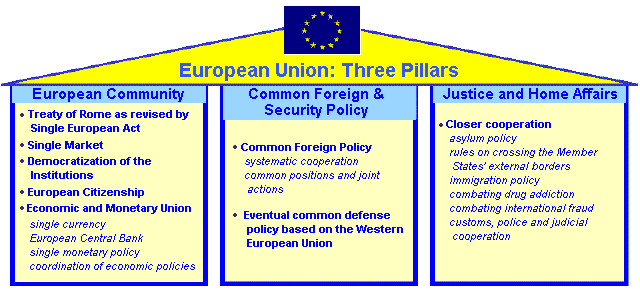
The European Integration |
The Origins of European Integration | ||
| EU Institutions | |||
| The Decision Making Process | |||
| EU Policies: from A to Z | |||
| The EU in the World | |||
The TreatiesThe road to European Union began with three separate treaties dating from the 1950s:
Collectively, they became known as the European Community. The Maastricht Treaty on European Union, which took effect in November 1993, was a major overhaul of the founding treaties. It created the "three pillars" of the European Union as it exists today. Pillar One incorporates the three founding treaties and sets out the institutional requirements for EMU. It also provides for supplementary powers in certain areas, e.g. environment, research, education and training. Pillar Two established the Common Foreign and Security Policy (CFSP) which makes it possible for the Union to take joint action in foreign and security affairs. Pillar Three created the Justice and Home Affairs policy (JHA), dealing with asylum, immigration, judicial cooperation in civil and criminal matters, and customs and police cooperation against terrorism, drug trafficking and fraud.
The CFSP and JHA operate by intergovernmental cooperation, rather than by Community institutions, which operate Pillar One. Maastricht also created European citizenship and strengthened the European Parliament's legislative role in certain areas. | |||

